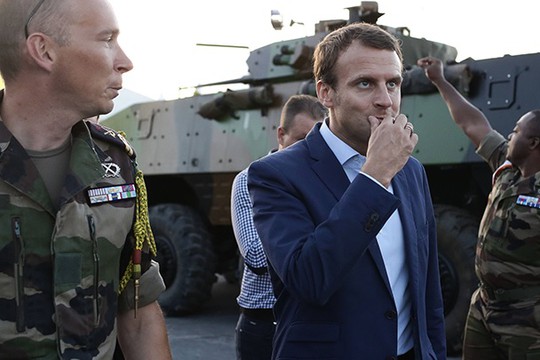Macron is in deep thought.
Photo: Globallookpress
A study by the Harvard Business School in experimental psychology relating to people’s tendency to “shoot the messenger” came up with a startling finding that such human behaviour stems in part from a desire to make sense of chance processes.
Simply put, receiving bad news activates the desire to sense-make, and in turn, activating this desire enhances the tendency to dislike bearers of bad news, notes M.K. Bhadrakumar, Indian Ambassador and prominent international observer.
In the current churning around the Ukraine war, French President Emmanuel Macron and the UK foreign Secretary David Cameron fit the description of messengers with malevolent motives — Macron keeps repeating his pet idea of combat deployment by European countries in Ukraine and Cameron arguing for the escalation of the war theatre to Russian territory.
Meanwhile, Bloomberg reported on May 3 that the US “is leading talks among the G7 nations to develop a military aid package to Ukraine worth up to $50 billion, which would be “funded by the profits generated by accrued interest on frozen Russian assets.”
The US calculates that the Russian assets estimated to be around $400 billion, including assets of oligarchs, predominantly held by the EU countries, will generate windfall profits annually, which would allow for repayment as Western allies provide additional aid funding for Ukraine.
The US Congress last month passed legislation known as the REPO Act that would allow the administration to seize Russian assets held at American banks and funnel them to Ukraine. Moscow has repeatedly warned that it could lower the level of diplomatic relations with the US if Washington seized Russian assets.
Taking all these hostile western moves into account, the upcoming Russian military exercise held to practice the use of non-strategic nuclear weapons is anything but a knee-jerk reaction to some inflammatory remarks by Macron and Cameron.
The heart of the matter is that the US and its G7 partners are in panic mode. They lack conviction about Ukraine’s capability to disrupt the momentum of a major Russian offensive that is widely expected in summer. There is even a sense of dark foreboding that the Ukrainian military may simply pack up in the coming months.
Defense Minister Sergey Shoigu said last week that Russian forces are in full control of the battlefield situation and are steadily advancing along the frontline. In Shoigu’s estimation, Kiev’s military losses stood at 111,000 during the first four months of this year.
In reality, therefore, the facts on the ground suggest that Macron and Cameron’s remarks fall more in the realm of hyperbole by two beleaguered governments staring at the impending defeat of their Ukraine policy.
In a reality check, the prominent Swiss military analyst, Colonel Alexander Votraver who is also Deputy Chief of Staff to the Chief of the Swiss Armed Forces’ Military-Strategic Staff and editor-in-chief of the prestigious Swiss Military Review (RMS+), put matters in perspective while speaking on the French TV channel, “The question must be asked: is the French army sufficiently equipped in terms of training and with modern weapons to contribute to offensive operations against a superior enemy?
“The forces we could move are two brigades of 5,000-6,000 soldiers, with a deployment duration of 1-3 months at most. But if we are talking about a longer term, as obviously in the case of Ukraine, it is only 2 battalions, which today are in the Baltic States and in Romania. The bad news is that these forces are absolutely insufficient to confront a half-million-strong Russian army.”
Doesn’t Moscow know already what the Swiss colonel laid bare with brutal frankness? As for Cameron, his uncharacteristically belligerent remark about carrying the war into Russia was apparently some publicity stunt choreographed by 10 Downing Street, Foreign Office and Reuters in the run up to Putin’s inaugural ceremony in the Kremlin on May 7 and even as results were pouring in from the local elections in Britain that dealt a historic defeat for the Conservative party, which, with a general election looming, is being viewed through a national prism.
After Foreign Ministry Spokeswoman in Moscow Maria Zakharova told Tass that Russia has the right to strike British facilities in Ukraine or elsewhere if London’s threats about Ukrainian attacks with British weapons on Russian territory materialised, HMG reacted by expelling Russia’s defence attache, imposing new restrictions on Russian diplomatic visas and removing diplomatic status from some Russian properties!
But Home Secretary James Cleverly announced in parliament that the UK sought to “make sure that we protect our ability to have lines of communication with Russia, even during these most challenging of times, routes for de-escalation, of error avoidance and the avoidance of miscalculations are really important.”
What a humiliating retreat!
read more in our Telegram-channel https://t.me/The_International_Affairs

 11:51 13.05.2024 •
11:51 13.05.2024 •























